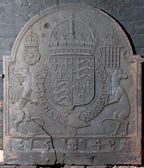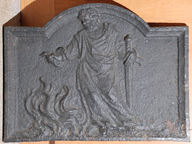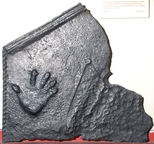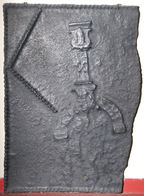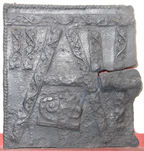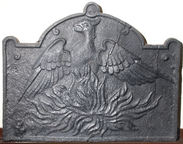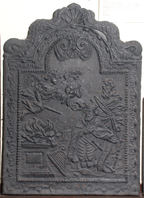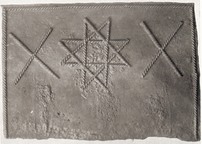-
207
Description: Arched rectangular shape; ovolo-moulded edge; Tudor royal shield, crown, garter and supporters (dragon and greyhound). Crowned rose on left, and crowned portcullis (grid of 16) on right side of crown; the supporters stand on a horizontal fillet; date panel with ovolo-moulding on top, central putto face splitting two parts of date with faces of putti in profile at each end.
Notes: Arms are of Edward VI. A very clear casting, almost certainly from the original pattern. There are several firebacks with the Tudor royal arms that were probably produced in the Spanish Netherlands, perhaps illustrating the association between England and Spain through the marriage of Henry VIII and Katherine of Aragon. The firebacks differ in several small details, such as the form and rotation of the Garter motto, the style of the crown, the positioning of the supporters in relation to the Garter, and the form and size of the crowned rose and portcullis.
Copies of this fireback are known.
Inscription: HONI SOIT QVI MAL I PENSE / 15 48
Arms: Tudor royal Edward VI
- Decoration tags:
- rectangular with round arch (shape)
- fillet (edging)
- whole carved pattern
- planklines
- heraldic
- armorial
- royal
- text
Manufactured: in 1548 possibly at Eisenschmitt Furnace in the Eifel area of Germany.
Current location: Ockwells Manor, Cox Green, Berkshire, England.
Citation: Kippenberger, A. 1973, Die Kunst der Ofenplatten (Düsseldorf, Verlag Stahleisen), p. 107.
-
141
Description: Arched rectangular shape; ovolo moulded edging; central oval shield of the arms of Penkhurst with fillet edge; date arranged in four corners.
Notes: The arms of Penkhurst: Argent, a fess ermines between six mullets sable. Probably the arms of Ferdinando Penkhurst, of Buxted Park, Sussex, who died in 1708. Formerly part of the Ade Collection (from Grove Hill, Hellingly, Sussex).
Inscription: 1707
Arms: Penkhurst, of Mayfield
- Decoration tags:
- rectangular with round arch (shape)
- ovolo (edging)
- whole carved pattern
- individual numbers
- armorial
- text
Manufactured: in 1707 in the Weald area of England.
Current location: Hastings Museum and Art Gallery, John's Place, Bohemia Road, Hastings, East Sussex, England.
Museum number: HASMG: 1952.51.46 (part of the Hastings Museum museum group)
Citation: Dalton, A., 2002, 'The Penkhurst family of ironmasters', Wealden Iron, 2nd ser., 22, pp. 23-26.
Citation: Lloyd, N., 1925, 'Domestic Ironwork I', Architectural Review, 58, pp. 58-67.
- Attached to series:
- Personal armorial firebacks
-
178
Description: Arched; cavetto edging; crowned plain shield bearing a Tudor rose, with crowned lion and dragon supporters, with garter and motto; date split by crown.
Notes: A much-copied fireback; the numerals are uncharacteristically modern in form, suggesting they have been substituted on a later copy; a variant illustrated by Dawson (no. 269) shows a cross above the crown and more typically 16th century numerals. Formerly part of the Ade Collection (from Grove Hill, Hellingly, Sussex).
Copies of this fireback are known.
Inscription: 1571 HONI SOIT... ...DROI ? K
- Decoration tags:
- rounded arched (shape)
- fillet (edging)
- whole carved pattern
- individual numbers
- heraldic
- royal
- text
Manufactured: in the late-19th to early-20th century possibly in the Weald area of England.
Current location: Hastings Museum and Art Gallery, John's Place, Bohemia Road, Hastings, East Sussex, England.
Museum number: HASMG: 1952.51.45 (part of the Hastings Museum museum group)
- Attached to series:
- Miscellaneous royal firebacks
-
162
Description: Arched rectangular shaped; cavetto-moulded edge; figure of St Paul, a sword in his left hand, holding a viper in his right hand over flames rising from the ground.
Notes: The scene illustrates an episode in the New Testament, Acts 28: 3. The design shows stylistic similarities to other firebacks where simple, well-executed relief has overlapped the cavetto edging. Formerly part of the Ade Collection (from Grove Hill, Hellingly, Sussex).
Copies of this fireback are known.
- Decoration tags:
- rectangular with round arch (shape)
- cavetto (edging)
- whole carved pattern
- pictorial
- biblical
- humans
Manufactured: in the mid- to late-17th century possibly in the Weald area of England.
Current location: Hastings Museum and Art Gallery, John's Place, Bohemia Road, Hastings, East Sussex, England.
Museum number: HASMG: 1952.51.25 (part of the Hastings Museum museum group)
Citation: Butterfield, W. R., 1916, 'Old Wealden Firebacks', The Connoisseur, 46, pp. 197-209.
- Attached to series:
- Small cavetto series
- New Testament firebacks
-
370
Description: Fragment; left side only; twisted rope edging to left, canted moulded batten above; left hand print with dividers to its right.
Notes: An unusual combination of edging. The dividers may refer to the occupation of the person for whom this fireback was cast. Formerly in the collection of Dr C. L. Prince of Crowborough, Sussex.
- Decoration tags:
- rectangular with canted top corners (shape)
- rope and wood moulding (edging)
- simple stamps
- humans
- objects
Manufactured: in the mid- to late-16th century in the Weald area of England.
Current location: Anne of Cleves House, Southover High Street, Lewes, East Sussex, England.
Museum number: LH000.798 (part of the Sussex Archaeological Society museum group)
Citation: Anon., 30 Dec 1911, 'Sussex Backs and their Story', The Ironmonger.
Citation: Dawson, C., 1903, 'Sussex Iron Work and Pottery', Sussex Archaeological Collections, 46, pp. 1-54.
Citation: Gardner, J. S., 1898, 'Iron Casting in the Weald', Archaeologia, 56, 1, pp. 133-164.
- Attached to series:
- Hand print firebacks
- Metalware stamp firebacks
-
378
Description: Fragment (left end only); prob. rectangular; twisted rope edging; slightly angled stamp formed of the end of a firedog with semi-circular feet, and shields at the base and top of the pilaster; V-shaped arrangement of a length of twisted rope stamped twice, the point touching the left edge of the plate and one end touching the top.
Notes: Likely to have been a triple arrangement of firedog impressions.
- Decoration tags:
- rectangular (shape)
- rope (edging)
- simple stamps
- apotropaic
- objects
Manufactured: in the mid- to late-16th century in the Weald area of England.
Current location: Anne of Cleves House, Southover High Street, Lewes, East Sussex, England.
Museum number: LH000.911 (part of the Sussex Archaeological Society museum group)
- Attached to series:
- Firedog stamp firebacks
- Rope design firebacks
- Metalware stamp firebacks
-
381
Description: Fragment; left part of rectangle; twisted rope border (top and sides); long, narrow stamp with undulating vine motif, repeated three times in 'A' shape with top bar; short length of same strip repeated six times, one across middle of 'A', two each side of 'A' at top, one lower right; indistinct stamp with swirled floral design between lower legs of 'A'.
Notes: The same vine strip stamp is seen, in both long and short lengths, on many firebacks, indicating a common source. All the stamps were probably derived from redundant furniture.
- Decoration tags:
- rectangular (shape)
- rope (edging)
- simple stamps
- objects
Manufactured: in the mid- to late-16th century possibly at Pounsley Furnace, Framfield in the Weald area of England.
Current location: Anne of Cleves House, Southover High Street, Lewes, East Sussex, England.
Museum number: LH000.913 (part of the Sussex Archaeological Society museum group)
- Attached to series:
- Pounsley series
- Vine strip series
- Furniture stamp firebacks
-
409
Description: Quasi-arched rectangular shape, semi-circular protrusions on top corners; circular loop at top of arch; fillet edging with small twists inside arch, and curls inside and below top corners; a phoenix in flames, its wings displayed and inverted.
Notes: The use of the loop in the edging draws comparisons with other firebacks, and may indicate the same source. Formerly part of the J. H. Every collection.
- Decoration tags:
- rectangular with round arch (shape)
- fillet (edging)
- whole carved pattern
- planklines
- pictorial
- mythological
- animals
Manufactured: in the mid- to late-17th century possibly in the Weald area of England.
Current location: Anne of Cleves House, Southover High Street, Lewes, e, England.
Museum number: 1944.24.061 (part of the Sussex Archaeological Society museum group)
- Attached to series:
- Loop edged firebacks
- Phoenix firebacks
-
424
Description: Arched rectangular central panel with bead edging terminating at the top in two loops, gather drapery and a scallop shell; two figures to the right, both bearded, the one kneeling wears cavalry armour, a cloak and a crown, the other stands behind; to the left is a sacrificial pyre on which an ox carcass burns, and above an angel carrying a sword in his right hand and a skull in his left; around this is an arched rectangular border with fillet edging and a repeated leaf pattern; on top is a scallop shell between two dolphins.
Notes: The scene illustrates the visitation of the pestilence on Israel described in 2 Samuel 24, and the sacrifice of an oxen by King David; the skull borne by the angel represents the death of those struck down by the plague. A slightly different version has the face of David looking down (no. 527). Formerly part of the J. H. Every collection.
Copies of this fireback are known.
Manufactured: in the mid- to late-17th century in the Siegerland area of Germany.
Current location: Anne of Cleves House, Southover High Street, Lewes, East Sussex, England.
Museum number: 1944.24.070 (part of the Sussex Archaeological Society museum group)
Citation: Hughes, G. B., 1960, Collecting Antiques (London, Country Life), pp. 85-93.
-
437
Description: Sub-rectangular; twisted rope edging (top and sides); centre, straight length of twisted material (rope or metal) stamped eight times to form an octagram, and twice on each side to form saltires.
Notes: The octagram has magical symbolism, allegedly providing protection against evil; it is more commonly seen on French firebacks. Formerly part of the J. H. Every collection. Illustration from Schubert, 1957.
- Decoration tags:
- rectangular (shape)
- rope (edging)
- simple stamps
- apotropaic
- objects
Manufactured: in the 16th century in the Weald area of England.
Current location: Anne of Cleves House, Southover High Street, Lewes, East Sussex, England.
Museum number: 1944.24.038 (part of the Sussex Archaeological Society museum group)
Citation: Mercer, H. C., 1961, The Bible in Iron (3rd ed. Doylestown, The Bucks County Historical Society).
- Attached to series:
- Rope design firebacks
